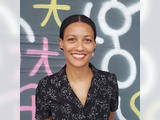Faculty Spotlight: Q&A with Jamyla Krempel
Prof. Krempel talks podcasting & radio history in Baltimore
by Jordan Lomax
Photo credit: Jamyla Krempel
I recently got to sit down with Jamyla Krempel, an Adjunct Instructor in the MCS Department. She teaches MCS 366: Podcasting, and works as a Digital Content Director at WYPR, a public radio station in Baltimore. Today, we get to learn about the new podcast Professor Krempel worked as well as a behind-the-scenes look at what podcast production is like.
Q: What’s your podcast called, and what’s it about?
It’s called Wavelength: Baltimore's Public Radio Journey, and it looks at four public radio stations in Baltimore: their origin stories, their evolutions, and what’s next for them. We focus on WEAA, WBJC, WTMD, and WYPR.
Q: How did the idea for this podcast come about?
It came from our General Manager, LaFontaine Oliver. It’s WYPR’s 20th anniversary year, and he wanted to do something that takes a look at our history, but he didn’t want it to be just a vanity project. We have a really great radio community in Baltimore, and so he wanted to talk about this shared story about radio in Baltimore, so we decided to look at those four stations and chronicle their rise and evolution.
Q: What topics do you cover in the podcast?
A lot of the stations started as college-run stations, so we started at the beginning, from the origins of radio period and then the origins of radio in Baltimore, going back to the 1920s. And each episode covers a specific time period, so the one that drops next Wednesday [per the date of this conversation] covers 1985 to 1995, so we’re looking at specific time periods and what was going on at those stations at the time. We have first-hand accounts from people who have worked at those stations, so there’s a lot of voices, we have some sound, air checks, and clips from shows during those particular years that we’re covering, so there are a lot of elements in each episode.
Q: What was it like doing the preparation, research, and pre-production for the project?
It was a lot. I have a Google folder that’s probably over 40 articles long of just things I’ve been reading– everything from newspaper articles, to old program guides, to academic articles about radio, videos, lots of things I’ve been collecting as I started to learn about these stations. I grew up in this area, so I was familiar with a lot of these stations but certainly not how they got started, so I learned a lot about them. I also learned a lot just from speaking to people. There's three of us on the team –myself (I’m the executive producing it), and then we have a producer and an audio editor– and so myself and our producer just started calling people and getting recommendations from people, and getting a lot of history that way just from talking to folks who were there at the time.
Q: What was the biggest challenge in producing the podcast?
Trying to cover such a wide span of history with so many different stations, because you want to be fair and you want to make sure every station is getting their story told. For example, for this episode, I have four voices from one particular radio station and two from another, and I was a little stressed about that, like “should I have four voices from each?” But that’s just not possible for everyone. But just wanting to do justice to each station’s story and trying to get as many voices as possible. There are a lot of people that want to participate that we don’t have the ability to incorporate, so that’s a little bit of a challenge.
And then, as we’re talking about the 60s and 70s, people don’t always remember every single detail, so trying to make sure this is a product of journalism where you want to fact check and you want things to be accurate, but sometimes there’s just no way to check these things. There was a funny thing that happened with the last episode in which someone gave us some tape. They didn’t lead us to believe it was their voice, but they didn’t say that it wasn’t, and it sounded like their voice. But after the podcast dropped –because in the script “this is so and so’s voice”– and they came back to the producer and said “oh, that wasn’t my voice,” and the producer was like “what do you mean?” So it can be tricky when you’re going back in time with something that covers history, but the pros outweigh the cons, so it’s fun.
Q: What has been your favorite part about producing the podcast?
Probably interviewing people, because it’s been a couple years since I’ve had the opportunity to do that. Just getting people’s stories, writing questions, and kind of letting the interviewee direct where the conversation was going, and go on tangents and remember things. I was listening back to an interview today with a host that I recorded, and he started singing one of the songs that he always used to play on the air. It’s just these really nice, personal moments and people have such a connection to that kind of work and are really proud of it, so it’s nice to be able to remind people of their contributions to the radio community.
—
You can listen to Wavelength: Baltimore's Public Radio Journey anywhere that you listen to your podcasts, as well as at wypr.org/wavelength. In another MCS twist, Dr. Loviglio is featured in several episodes of Wavelength, including this month's, on the era of 2000-2010, which dropped this week!Posted: June 1, 2022, 4:57 PM
